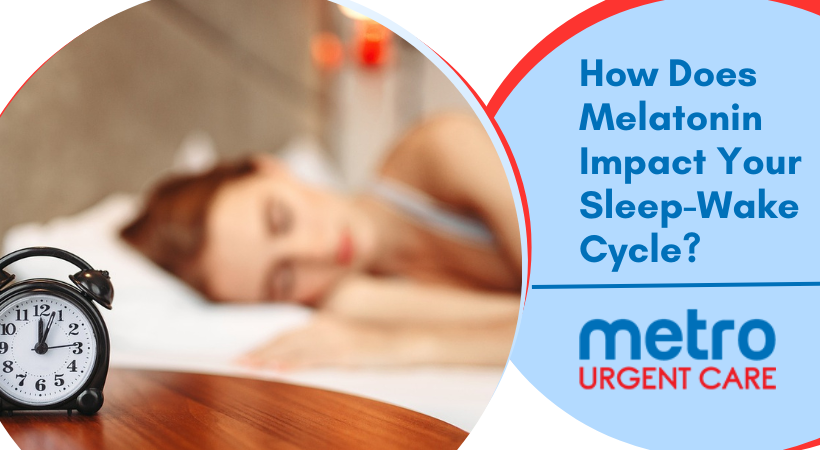Sleep is important for your overall health and well-being, as it helps maintain your physical, emotional, and mental health optimally. However, do you know melatonin (sleep hormone) plays a crucial role in your sleep-wake cycle? It signals your body when it is time to sleep and wake up. Though melatonin is naturally produced in the body, increased screen time or improper sleep hygiene might reduce its production. Hence, melatonin supplements are given to achieve a consistent sleep-wake cycle. According to the Sleep Foundation, 27.4% of adults take melatonin to get peaceful sleep, and 88% of adults taking melatonin fall asleep quickly.
Let us discuss everything about melatonin and how it impacts your sleep-wake cycle.
What Is Melatonin?
The pineal gland in the brain produces a hormone called melatonin that plays a vital role in regulating circadian rhythms (sleep-wake cycle). When it is dark, your pineal gland releases melatonin into your bloodstream, prompting your body to sleep, and when morning approaches, the hormone levels start to decrease gradually, signaling your body to wake up. This hormone's production is blocked during exposure to light (via watching TV or mobile) at night, and consequently, circadian rhythm regulation is affected, resulting in inconsistent sleep-wake cycles.
Benefits of Melatonin
- Regulates Better Sleep: Melatonin regulates your sleep-wake cycle while helping to treat issues like insomnia.
- Promotes Eye Health: Melatonin is rich in antioxidants that prevent eye cell damage and treat conditions like age-related macular degeneration and glaucoma, thus keeping your eyes healthy.
- Autism: Autism patients may have a lack of melatonin production, thus having poor quality sleep. However, melatonin helps them have uninterrupted and peaceful sleep.
Benefits of Melatonin for Different Demographics
Melatonin for Children
- It helps children with insomnia to fall asleep faster
- Beneficial in children with medical conditions, such as autism spectrum disorder and epilepsy
- Improves sleep duration
Melatonin for Adults
- It helps people with delayed sleep-wake phase disorder adjust their sleep cycle
- People working in different shifts (night or morning) can take melatonin to regulate their sleep cycle
- Allows people with jet lag to reset their sleep-wake cycle and have better sleep
Melatonin for Pregnant Women
- It improves sleep, especially for women working at night or in shifts
- Enhances fertility
- Promotes normal placental development and function
- It may minimize the risk of preeclampsia and preterm birth
Melatonin's Impact on Sleep Quality
Though melatonin helps to regulate your sleep-wake cycle, it is essential to establish healthy sleep habits rather than relying on melatonin supplements.
You can optimize your sleep-wake cycle by:
- Practice Proper Sleep Hygiene: Sleep hygiene refers to practicing behaviors that improve your sleep quality, including creating a sleep-friendly environment, refraining from consuming alcohol or caffeine before going to bed, investing in a soothing bed and mattress, and sleeping and waking up at the same time every day.
- Reduce Screen Time at Night: Electronic devices such as tablets, TVs, smartphones, and computers emit blue light that can disrupt your circadian rhythm, affecting your ability to fall asleep. So, limiting screen time can improve your sleep quality.
- Have a Short Afternoon Nap: Short naps lasting 10 to 20 minutes are recommended for sleep-deprived individuals to compensate for their lost sleep. These brief naps can help you feel rejuvenated without interfering with your ability to fall asleep at night. Nevertheless, longer naps may disrupt your regular sleep schedule, causing difficulty falling asleep at your usual bedtime.
Melatonin's Role in Sleep Disorders
Low levels of melatonin can cause sleep disorders, such as:
- Delayed Sleep Phase Disorder: It causes you to wake up more than two hours later than your usual sleep-wake cycle.
- Advanced Sleep Phase Disorder: It involves falling asleep in the early evening (6 p.m. to 9 p.m.) and waking up early (2 a.m. to 5 a.m.).
- Non-24-Hour Sleep-Wake Syndrome: It is characterized by maintaining a consistent duration of sleep and wakefulness while having an internal clock that operates longer than 24 hours. As a result, the sleep-wake cycle shifts daily, with a delay of one to two hours each day.
Whom Can You Seek for Melatonin Dosage?
Taking too much melatonin can disrupt your sleep patterns and lead to side effects such as headaches, dizziness, nausea, etc. On the other hand, taking too little may not provide the desired sleep benefits. Therefore, it is essential to consult with a healthcare professional before starting melatonin supplementation, as they can help determine the appropriate dosage based on your needs, age, and health status.
Final Thoughts
Ensuring a balanced sleep-wake cycle can significantly impact your physical and mental well-being. However, achieving this balance in today's fast-paced society can be challenging. This is where melatonin supplementation can play a crucial role. Melatonin can help improve your sleep quality and duration. Still, you must be mindful of how and when to take melatonin, as improper use can disrupt our body's natural sleep cycle. Consult a doctor for the proper dosage and directions for use.
Struggling with an Inconsistent Sleep-Wake Cycle? Visit Metro Urgent Care!
At Metro Urgent Care, we understand the importance of a regular, constant sleep cycle, so we provide expert advice and guidance on melatonin usage for sleep regulation. With experienced medical professionals on board, we provide personalized recommendations tailored to your specific needs and concerns. Contact us today to enjoy a healthy sleep pattern.


